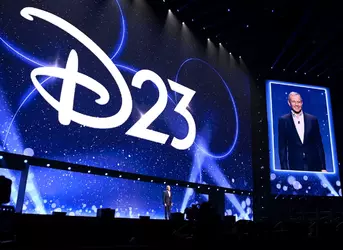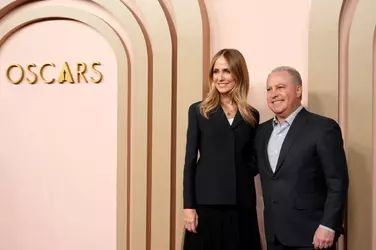WSJ (Archive) - November 12, 2024
by, Robbie Whelan, Emily Glazer, and Jessica Toonkel

Disney is exploring fresh candidates in its search for a successor to Bob Iger, including some from outside its castle walls, as the board and its newly named chairman move to bring order to a closely watched succession process.
Names that have surfaced in Disney’s deliberations in recent months include external candidates, such as Andrew Wilson, chief executive officer of game company Electronic Arts, people familiar with the matter said. Disney is working with recruiters from the firm Heidrick & Struggles to help guide its review of external candidates, and the search firm has identified at least two more potential external candidates, these people said.
The developments are a sign that incoming board chairman and former Morgan Stanley CEO James Gorman, who starts his new role on Disney’s board in January, wants to explore a range of candidates, and that the stable of contenders may broaden. Disney said last month that it plans to name Iger’s replacement in early 2026, later than initially planned.

What appeared to be an internal horse-race between a core cluster of four tenured Disney executives could now be anyone’s game.
Disney and Wilson, the Electronic Arts chief, have been in touch repeatedly in recent years. In 2018, he interviewed for the top job at ESPN before it went to current chief Jimmy Pitaro. Then, during Bob Chapek’s tenure as Disney CEO, Wilson had talks about potentially selling EA to Disney, but the negotiations didn’t lead to a deal, according to people familiar with the talks. Puck earlier reported that Wilson had interviewed and discussed potentially selling the company to Disney.
As Disney explored options over the past year for a strategic partner for ESPN, the company talked to Wilson about a partnership between EA and ESPN, according to people familiar with the matter. Those talks didn’t result in a deal.
Disney has said videogames represent an important growth area for the company, and earlier this year announced an expanded partnership with Fortnite maker Epic Games.
Gorman, who describes himself as an aficionado of the chief executive role and shepherded Morgan Stanley through a relatively drama-free succession process, is focused on finding the right candidate to help Disney move past its reliance on its larger-than-life CEO.
The former Wall Street executive was named incoming chairman last month, succeeding former Nike CEO Mark Parker, who will leave the board on Jan. 2. Gorman has been chair of the Disney board’s CEO succession-planning committee since August.
It is still early days for the Disney succession race, and it is unclear who may ultimately be elevated to the top job. Disney is scheduled to report its financial performance for the September quarter on Thursday.

Before Gorman’s ascent, four Disney executives were viewed inside the company as front-runners. Each of them is in the throes of efforts to turn around the fortunes of Disney, which, like many of its rivals, is contending with cord-cutting, the rise of streaming and changing moviegoing habits.
Dana Walden and Alan Bergman, co-chairs of the entertainment division, are overseeing a pivot to streaming while trying to manage the slow decline of the cable industry and a less predictable theatrical business as moviegoing habits change. Josh D’Amaro, the head of theme parks and experiences such as cruises and resort vacations, is working to ensure that Disney’s main profit engine keeps humming in the face of slowing parks attendance, while ESPN boss Pitaro is busy helping the sports giant transition to a streaming future.
Iger has vowed to step down when his contract expires at the end of 2026 and has himself explored ideas for how to fill the top job, including by appointing two CEOs to share it. Some company observers have pointed out that Walden and D’Amaro have complementary skill sets—she as a TV executive who works closely with studio talent and he as an operational expert with finance chops—and might work well as co-CEOs.
Iger called Netflix co-CEO Ted Sarandos earlier this year asking if the streaming giant’s dual CEO setup worked. He wanted to know how the arrangement was going and if Sarandos thought it could work at Disney, according to people familiar with the conversation.
Sarandos said the structure worked well at Netflix largely because of the company’s culture, which encourages candor and transparency. He shared the top job for years with co-founder Reed Hastings, and now splits it with former head of product Greg Peters.
Iger and the board’s efforts to name a successor aren’t just crucial for the future of Disney, the decision will also help define the star CEO’s legacy.
Gorman called Iger a “rare combination of extraordinarily good creative instincts with great business judgment” during a mid-October event for trade group the National Association of Corporate Directors, when asked by an audience member about Disney.
He said he understood why Disney wanted to keep Iger around so long. “But people don’t last forever, so eventually you have to move,” he said.
Gorman said he was attracted to the Disney board because it presented an opportunity to create a formal process around succession planning and “work with intent. Have absolute clarity around dates and timing, the development of talent and just run it like you would any normal business process.”
by, Robbie Whelan, Emily Glazer, and Jessica Toonkel

Disney is exploring fresh candidates in its search for a successor to Bob Iger, including some from outside its castle walls, as the board and its newly named chairman move to bring order to a closely watched succession process.
Names that have surfaced in Disney’s deliberations in recent months include external candidates, such as Andrew Wilson, chief executive officer of game company Electronic Arts, people familiar with the matter said. Disney is working with recruiters from the firm Heidrick & Struggles to help guide its review of external candidates, and the search firm has identified at least two more potential external candidates, these people said.
The developments are a sign that incoming board chairman and former Morgan Stanley CEO James Gorman, who starts his new role on Disney’s board in January, wants to explore a range of candidates, and that the stable of contenders may broaden. Disney said last month that it plans to name Iger’s replacement in early 2026, later than initially planned.

What appeared to be an internal horse-race between a core cluster of four tenured Disney executives could now be anyone’s game.
Disney and Wilson, the Electronic Arts chief, have been in touch repeatedly in recent years. In 2018, he interviewed for the top job at ESPN before it went to current chief Jimmy Pitaro. Then, during Bob Chapek’s tenure as Disney CEO, Wilson had talks about potentially selling EA to Disney, but the negotiations didn’t lead to a deal, according to people familiar with the talks. Puck earlier reported that Wilson had interviewed and discussed potentially selling the company to Disney.
As Disney explored options over the past year for a strategic partner for ESPN, the company talked to Wilson about a partnership between EA and ESPN, according to people familiar with the matter. Those talks didn’t result in a deal.
Disney has said videogames represent an important growth area for the company, and earlier this year announced an expanded partnership with Fortnite maker Epic Games.
Gorman, who describes himself as an aficionado of the chief executive role and shepherded Morgan Stanley through a relatively drama-free succession process, is focused on finding the right candidate to help Disney move past its reliance on its larger-than-life CEO.
The former Wall Street executive was named incoming chairman last month, succeeding former Nike CEO Mark Parker, who will leave the board on Jan. 2. Gorman has been chair of the Disney board’s CEO succession-planning committee since August.
It is still early days for the Disney succession race, and it is unclear who may ultimately be elevated to the top job. Disney is scheduled to report its financial performance for the September quarter on Thursday.

Before Gorman’s ascent, four Disney executives were viewed inside the company as front-runners. Each of them is in the throes of efforts to turn around the fortunes of Disney, which, like many of its rivals, is contending with cord-cutting, the rise of streaming and changing moviegoing habits.
Dana Walden and Alan Bergman, co-chairs of the entertainment division, are overseeing a pivot to streaming while trying to manage the slow decline of the cable industry and a less predictable theatrical business as moviegoing habits change. Josh D’Amaro, the head of theme parks and experiences such as cruises and resort vacations, is working to ensure that Disney’s main profit engine keeps humming in the face of slowing parks attendance, while ESPN boss Pitaro is busy helping the sports giant transition to a streaming future.
Iger has vowed to step down when his contract expires at the end of 2026 and has himself explored ideas for how to fill the top job, including by appointing two CEOs to share it. Some company observers have pointed out that Walden and D’Amaro have complementary skill sets—she as a TV executive who works closely with studio talent and he as an operational expert with finance chops—and might work well as co-CEOs.
Iger called Netflix co-CEO Ted Sarandos earlier this year asking if the streaming giant’s dual CEO setup worked. He wanted to know how the arrangement was going and if Sarandos thought it could work at Disney, according to people familiar with the conversation.
Sarandos said the structure worked well at Netflix largely because of the company’s culture, which encourages candor and transparency. He shared the top job for years with co-founder Reed Hastings, and now splits it with former head of product Greg Peters.
Iger and the board’s efforts to name a successor aren’t just crucial for the future of Disney, the decision will also help define the star CEO’s legacy.
Gorman called Iger a “rare combination of extraordinarily good creative instincts with great business judgment” during a mid-October event for trade group the National Association of Corporate Directors, when asked by an audience member about Disney.
He said he understood why Disney wanted to keep Iger around so long. “But people don’t last forever, so eventually you have to move,” he said.
Gorman said he was attracted to the Disney board because it presented an opportunity to create a formal process around succession planning and “work with intent. Have absolute clarity around dates and timing, the development of talent and just run it like you would any normal business process.”

